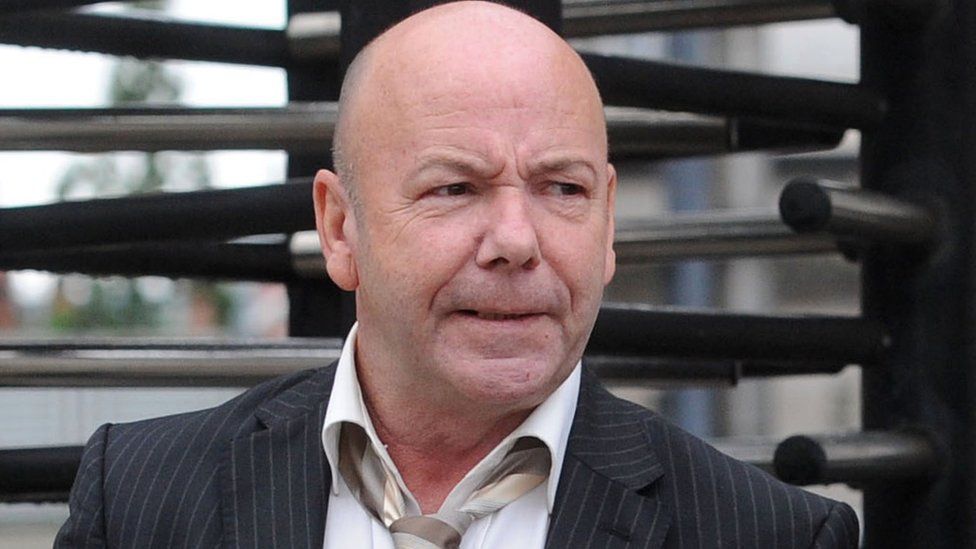Liam Holden: Army torture forced murder confession, court rules
- Published

Parachute Regiment troops tortured Liam Holden, pictured in 2012, into saying he killed a soldier, the judge ruled
The family of a Belfast man has been awarded £350,000 in damages after he was tortured into admitting killing a British soldier in 1972.
Liam Holden was subjected to waterboarding techniques while in military custody and his treatment led to a confession, the High Court ruled.
His conviction for murdering Private Frank Bell was quashed a decade ago.
The last man in the UK sentenced to hang, Mr Holden died last September, aged 68.
His death penalty was commuted and he was released 17 years into a 40-year sentence, the rest of which he spent on licence.
He always maintained he was hooded, waterboarded and had a gun pointed at his head before wrongly admitting to shooting Private Bell.
Mr Holden's murder conviction was finally quashed in 2012, and he was then awarded £1m for losses suffered due to the miscarriage of justice.
'Soldiers acted in bad faith'
Delivering Friday's ruling in the damages case against the Ministry of Defence (MoD), the judge said Mr Holden genuinely believed he was going to be killed.
With paratroopers having wrongly and unlawfully induced him to make the admission, the MoD was held liable for his malicious prosecution and misfeasance in public office.
"The plaintiff was subjected to waterboarding; he was hooded; he was driven in a car flanked by soldiers to a location where he thought he would be assassinated," said the judge.
"A gun was put to his head and he was threatened that he would be shot dead.
Liam Holden, aged 18, was taken into police custody in 1972
"Hooding of the plaintiff, in the circumstances as alleged, constitutes inhuman and degrading treatment in breach of Article 3 of the [European Convention on Human Rights]," he said.
The judge said that while the soldiers had an "honest belief" they were acting lawfully they knew their actions would injure Mr Holden and "unquestionably acted in bad faith".
Their actions left Mr Holden with significant psychological effects, said the judge.
According to the Holden family and their solicitor, this was the first time a court had found waterboarding took place during The Troubles.
After the ruling, the family expressed sadness and relief.
"My father is not here to see this finished," his son Samuel Bowden told BBC Radio Ulster's Talkback programme.
"What he went through should never have happened... today it's all clear that he was innocent."
'Like I was drowning'
At a previous court hearing, Mr Holden gave his account of his treatment by soldiers after his arrest.
He said he was pinned to the floor while a towel was placed over his face.
"They started pouring a bucket of water slowly through the towel," he said.
"The first thing I felt was the cold, then trying to breathe and then sucking water in through my mouth and up my nose.
"It was like you were just drowning."
Samuel Bowden (right) said the ruling left the family with a sense of sadness and relief
He said that up to four sessions of questioning and waterboarding were carried out.
Mr Holden was then hooded, dragged out of a chair and taken to a loyalist area of Belfast.
"While we were driving one of the soldiers was tapping my knee with a gun, saying: 'This is for you'," he told the court.
"They took me out of the car and brought me into a field, put a gun to my head and said if I didn't admit to shooting the soldier they would shoot me."
Asked by his barrister how he had responded to the alleged threat, Mr Holden replied: "I just said: 'I shot the soldier.'
"[I] made a cock-and-bull story about where I shot him from, where I got the weapon, where I dumped the weapon and how I got away."
A forensic psychiatrist who examined Mr Holden in 2016 said he described being plagued by nightmares more frightening than any real-life experience.
His son Samuel said his criminal record made it difficult to get work, leave the country or just "get a normal life going".
Related Topics
- Published21 June 2012
- Published21 June 2012